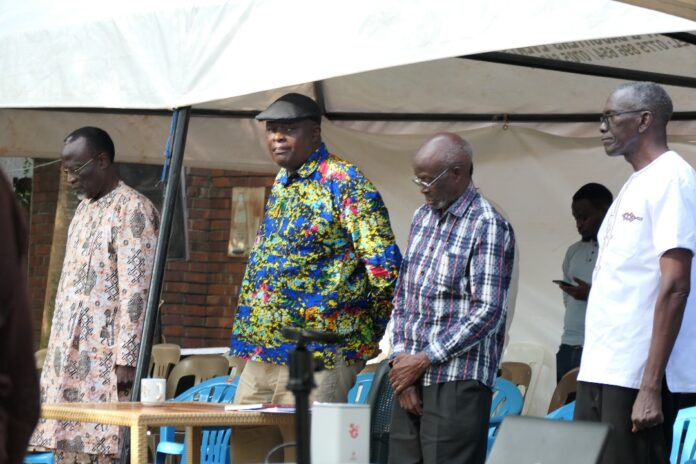The students expressed a desire for their education to include more about influential Ugandan figures, such as I.K. Musazi, a key pillar in the country’s political history, whose contributions deserve greater recognition.
At a commemorative event to mark Uganda’s 62 independence anniversary held at Namukala point , Kitala Entebbe , the Mayor of Katabi Town Council , Ronald Kalema, voiced concern that I.K. Musazi one of the foundational figures in Uganda’s political history remains largely unknown inspite of his being declared a national hero.
Earlier, Kitala Senior Secondary School, Entebbe students’ had revealed that much of the history taught in their schools centres around Western figures like Napoleon, Otto von Bismarck among others, while little attention is given to Uganda’s rich history.
Kalema offred to host the 2025 IK Musazi memorial events in Katabi , Entebbe pointing out that celebrating Musazi’s legacy in Entebbe helps raise awareness of his contributions, especially among the local community.
Incidentally , Entebbe, the then seat of the colonial government, was a common venue for Musazi’s public rallies held under a tree named the “Freedom tree’.
This was one of a pair of Mvule trees, the original found in Kampala at the site of the Old Taxi park,named Omuti ogwe Ddeembe, a losse transaltion of Freedom tree, that convenient with natural shade offered canopy for anti colonial activism.
Musazi had rolled out his vision for an independent and self-sustaining Uganda from the local community, namely Katwe, where the offices of his Federation of African Farmers Associations of Uganda were found. It is through this organisation that he identified Mathias Ngobi from Busoga, Cuthbert Obwangor from Teso, Magezi from Bunyoro, Felix Onama from West Nile and others nationwide to form the Uganda National Congress, Uganda’s first national political party in 1952.
Prof. Samwiri Lwanga Lunyiigo, patron of the Namakula point and this year’s convenor of the annual IK Musazi memorial symposium , in his keynote address noted that many heroes in Uganda are often only recognized after they are gone.
Lunyiigo explained that Musazi joined the fight against colonialism long before many others did, which demonstrated how brave and exceptional he was as a character, and he paid a high price in imprisonment. According to Musazi’s wife, Mary Ritah Nansinkombi, Musazi was jailed 37 times in his pursuit of Uganda’s independence.
“He was heavily involved in the early cooperative movement, and it was largely due to the pressure from him and other cooperators that, in 1945, cooperatives were officially registered and recognized by the colonial government for the first time.”
Lunyiigo pointed out that Musazi and his colleagues understood that the cooperative movements were the key to empowering ordinary people economically.
Lunyiigo highlights that the victory of legalizing and registering local cooperatives was a significant struggle, as the commanding heights of the economy during the colonial period were dominated by Asians and Indians who opposed this movement because it would create competition for them in business, where they had monopolized the ginning of cotton and the processing of coffee.
“Through the cooperative movements that’s how Africans began to gin cotton and process coffee and the movement boomed. By 1965, the movement had established its own financial institution, the Uganda Cooperative Bank,” Lunyiigo says.
He added that the cooperatives employed many people across the country. The subsequent recognition of co-operatives by the colonial government was a significant achievement for IK Musazi.
Lunyiigo notes that Musazi not only embraced the Uganda project but was also a dedicated Pan-Africanist. He attended the Pan-African Congress in Manchester in 1945 alongside notable figures like Kenyatta and Kwame Nkrumah.
Many believed that Musazi would assume leadership in Uganda; however, he eventually stepped back and conceded leadership to Milton Obote.
Providing context for Musazi’s opposition to colonialism, Uganda’s Deputy High Commissioner to South Africa Kintu Nyago explains that Musazi was denied ordination as a priest by the Church of England despite having completed his studies at an Anglican seminary in the United Kingdom.
The Church of England referred him to his native country to be ordained by the Native African Anglican Church.
Nyago states that Musazi returned a disappointed man and subsequently began to actively oppose colonialism.
On behalf of the Chairperson, IK Musazi memorial foundation, Ambassador Elizabeth Musazi , former Deputy Chief Justice Steven Kavuma, emphasized that Musazi deserves to be celebrated as a nationalist, patriot, and Pan-Africanist, in recognition of his significant contributions to Uganda’s struggle for independence.
Justice Kavuma discouraged the tendency of people to glorify the mistakes of leaders while overlooking their positive contributions.
He further remarked, “While he may have made mistakes, philosophers argue that all humans are born obnoxiously bad, and as a consequence of that are all bound to make mistakes.
What matters is not glorifying those mistakes, but rather learning valuable lessons from them.”



